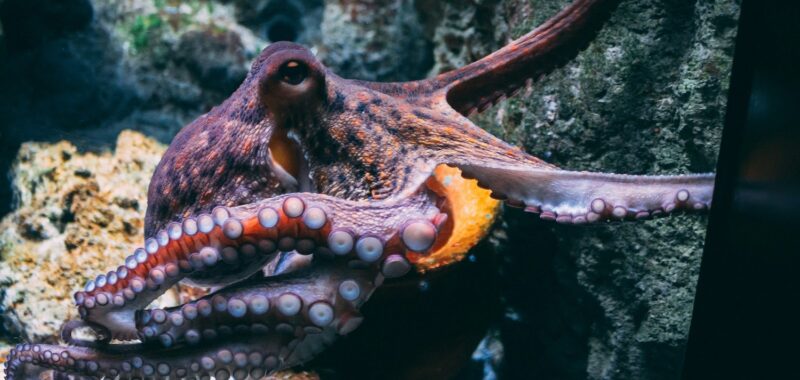Modern science has profoundly changed humans’ view of animals. In the dominant culture, it’s long been an article of doctrine that Man is the pinnacle of creation, that his brain is the biggest and the brightest, and that all other animals are inferior in intellect. He’s Man the Tool User, Man the Dreamer and Artist and Fabulist, Man the ruler of all he surveys.
And yet, the more we study the animals with whom we share the planet, the more we come to understand that there’s more to them than we ever used to imagine. We may be sitting on top of the food chain, but there’s a whole lot going on along the rest of the spectrum.
We’ve long had a close relationship with land mammals and birds. Creatures of the sea are less familiar, aside from seals and whales and dolphins, all of whom have a certain mythic resonance. Everything else is just alien.
One species had managed to be both mythic and alien: the cephalopod, including the octopus. Its beautiful weirdness has captivated humans since ancient times. Its soft bag of a body, its sharp beak, its large and luminous eyes, and above all its eight tentacles with their eerie flexibility and their powerful suckers. It’s a work of art, enshrined in Minoan paintings and pottery, all the way down through the centuries to quite remarkable Japanese woodcuts and modern artistic renderings of the ancient species. (Tentacle porn is very much a thing.)
As famed as the octopus is in art and cookery, modern science has discovered something unexpected. The octopus is smart. Not only that: It has a personality. And even more unexpectedly, a sense of humor.
This is a truly alien organism, as much so as if we met it on another planet. Its blood is hemocyanin blue rather than hemoglobin red, evolved to transport oxygen more efficiently in the cold of the deep sea. Its basis is copper rather than iron.
The hearts that pump it are equally weird by human standards. There are three. Two pump oxygenated blood through the gills, and one carries it through the rest of the animal. The third heart stops when the octopus swims, which means it can’t do that for long. For the most part, an octopus is better off crawling around the sea floor with all of its hearts going at once.
The octopus’ neurological system is different as well. Two-thirds of it lives in the arms, which means that some of the arms are capable of independent function. If you sever an octopus’ arm, it can still move and curl and grasp. This allows for true multitasking. The octopus as a unit may be scoping out the next pool over while an arm or two works out how to get into a mollusk’s shell.
Octopus tentacles are both dexterous and powerful and its beak is often venomous, but the animal is still a soft, delectable creature without much by way of physical armament. It makes up for this in a couple of ways. One most varieties of octopus share with squid: it can emit a cloud of ink to distract a predator. Octopus ink is not poisonous, but it may irritate the pursuer’s eyes and confuse its senses.
The other way many octopuses protect themselves is quite honestly a superpower. They are masters of disguise. Thanks to specialized skin cells called chromatophores, an octopus can literally disappear. Its whole body will change color, until it’s indistinguishable from the area around it. A mimic octopus can even impersonate another animal, such as a sea snake. The process is incredible to watch.
As amazing as octopus bodies and smarts may be (and we’ll have more to say about those in the next few articles), their reproductive system is literally their fatal weakness. Sexual maturity for an octopus is a terminal condition. Their bodies are programmed for a very short life span, from six months to five years.
Males, once they breed, die quickly, either because the female has eaten them or because their bodies just quit. Females survive to lay their eggs, but by that time have stopped eating; they’re dead before the eggs hatch. For an octopus, love is death. Neither parent lives to see the next generation.
To the human mind, and especially for a human who has come to know and love an individual octopus, this is a terrible tragedy. I suspect that if we can at some point ask an octopus about it and get a comprehensible answer, that will be along the lines of, This is how it is. It’s what we are. Our lives are just as long as they need to be, and we make the most of it.

